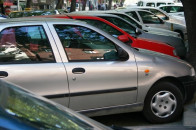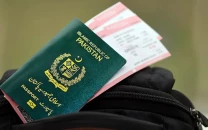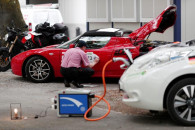Flaws in our democracy
Are we just a democracy in name, or in substance too?

The writer is an Islamabad-based TV journalist and tweets
@FarrukhKPitafi
The conclusion of this leapfrogging journey calls for deeper reflection. Some introspection. Judging by the comments appearing in this paper and others, intellectuals and opinion leaders are already taking stock of the five years of the government’s performance. But I mean even deeper introspection. What we set out to be and what we became? Are we just a democracy in name, or in substance too? And if we have not achieved what we said we would, is there a way to correct the course?
To be honest, I do not consider democracy as something that you either have in totality or you don’t. It is possible for a functioning democracy to have some trappings of authoritarianism. It is also possible for a dictatorship to have a few shades of democratic gray. To explain Pakistan’s situation, I invoke Pareto’s principle, also known as the 80/20 rule, in a way he would not have imagined in his wildest dreams.
So, it goes like this. The democratic governments in Pakistan have never exhibited more than 80% of democratic values. Never. Fifteen per cent is given to autocratic whims of one leader or the other. The remaining 5% is plagued by inefficiency, incoherence and total paralysis of imagination. And in Pakistan authoritarian leaders exhibited around 20% of democratic tendencies. They all conducted elections, no matter how twisted and manipulated. They all sought to strengthen local governments. The worst of them all, Zia, reversed Bhutto’s disastrous policy in Balochistan. This, by no means, diminishes the terrible things they did. But we should have moral courage to say that they occasionally did something right. And this actually bolsters my broader thesis that the people of Pakistan have always been more democratic than we acknowledge. That democratic impulse is what always brought us back to some semblance of democratic rule each time a dictator exited the picture. Ergo our very own 80-20 principle.
But the 80% in this equation primarily concerns us. And while analysing this we often forget that only 10 years ago the country had a deeply entrenched authoritarian rule. It is a huge transition to make. Dictators usually don’t just disappear. Before they retreat they get ample time to poison the well. The governments that succeed them often complain they don’t have enough oxygen in the room to function. In the past 10 years we have seen this at a granular level. Painful? Yes. Hopeless? No.
It takes some time for democracy to take root. Our impatience with the system has been breathtaking. In a civil-military equation that is still trying to find its feet we pretend we can wish away the behind-the-scenes influence of the country’s army and intelligence community. Remember, we do not function in a vacuum. Causality cannot be wished away. You build bridges with hard work, dedication, patience, trust and unimpeachable negotiation skills. But here is the brighter side of the picture. It isn’t as laborious as we think. The other side, battle scarred and overstretched as it is, wants to help you get there. But you carry your baggage and refuse to see the brighter side. Enter the tricksters. The perception manipulators. The hitmen. The interest groups. The shadow warriors. These groups thrive on anarchy and chaos. They bend light and sound in a manner that even the sanest of political operators see phantoms where none exists. This leads to friction in the system.
Back to flaws in our democracy. Politicians fall prey to this paranoia because they lack in democratic substance and homework. Substance, because inside every party there is lack of democracy. Given that most parties are personality cults they either have the same person heading them for decades or one dynasty has a firm grip on the party. That is a reality. But trouble arises when the rest of the office-bearers are only nominally elected at best. This creates a human resource problem. The best advice given to the party leader is the one he/she likes, not the one he/she needs. Sycophancy hence trumps genuine merit. The PPP and the PML-N were plagued by this disease since their inception. However, our challenger, the change agent, the PTI, that was supported by the urban middle class because it permitted some measure of upward mobility, has compromised this virtue to such an extent that people openly joke about the two ATMs. The two rich men whose riches often trump genuine merit.
And that is not all. There is an inbuilt abhorrence in our political parties for the third tier of governance. This is where bureaucracy often comes to their help. No one realises that in a country with a rapidly growing population, provincial governments and bureaucrats are equally ill-equipped to cater to the needs of local governance. And that is why without a thriving local government, democracy in Pakistan is incomplete and exclusive.
And then there is the matter of homework. Our lawmakers do not have support/research staff. This can be easily remedied but nobody works on it. Political governments generally lack the skill to build consensus and often seek outside help. Two glaring examples are economy and the fight against extremism. In PPP’s case the party could not find a permanent finance minister when in power.
There is no concept of a shadow cabinet. We seek a robust parliamentary committee system but do not write laws to equip these committees with subpoena powers. Manifestoes are written as part of an election ritual and cast away the moment parties enter power corridors. We do not have effective campaign finance or disclosure laws. The treasury of each party is usually empty in the absence of rich benefactors. The ability to plan ahead and avoid glaciers is precisely like that of RMS Titanic. The acceptance and effective channelling of dissent is nonexistent. There is no internal dispute-resolution mechanism in any party that we know of.
In these stagnant waters, any dynamic, organised, merit-based force (army and intelligence from outside and bureaucracy from within) can lead you by the nose and diminish you when you refuse to cooperate. The best way to fight autocracy is to overcome your own weaknesses. The best way to ward off blackmailers is to stop hiding skeletons in your closets. The best way to strengthen democracy is to add democracy. Not where you want to install it. But where you don’t want to look. Until that is done, democracy in the country will remain vulnerable and prone to disruption. Give us that which needs to be given and you will have unshakable, all pervasive faith in democracy.
Published in The Express Tribune, May 31st, 2018.
Like Opinion & Editorial on Facebook, follow @ETOpEd on Twitter to receive all updates on all our daily pieces.



1729685382-0/Untitled-design-(57)1729685382-0-208x130.webp)










COMMENTS
Comments are moderated and generally will be posted if they are on-topic and not abusive.
For more information, please see our Comments FAQ